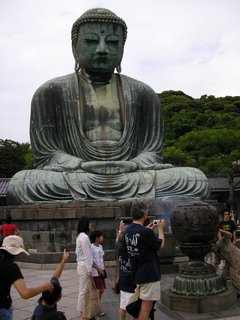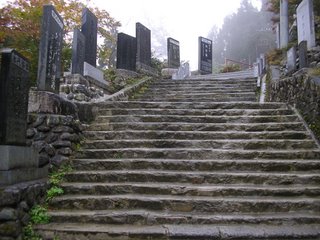Shinto 2 - Born Shinto, die Buddhist
Japanese religion beautifully demonstrates their assimilative tendencies. I think I can safely say that the only genuinely Japanese phenomena I've encountered, are personality, rice and the ability to draw upon influences from the rest of the world and adapt them to suit the populace.
 Shinto was only defined as a religion in order to distinguish itself from Buddhism... and to further muddy the waters, since Japans first encounter with writing was brought over from China by Buddhist missionaries, terms and concepts were taken from that religion and Confucianism, in order to express Shinto as a system of thought, but also to encourage a sense of national identity when dealing with foreign powers.
Shinto was only defined as a religion in order to distinguish itself from Buddhism... and to further muddy the waters, since Japans first encounter with writing was brought over from China by Buddhist missionaries, terms and concepts were taken from that religion and Confucianism, in order to express Shinto as a system of thought, but also to encourage a sense of national identity when dealing with foreign powers. Buddhism and Shinto fused - sometimes, the Buddha is seen as a Kami, and by contrast, Buddha-hood can be seen as the state that all creatures, including Kami, aspire to. However, part of this assimilation resulted in Japanese Buddhism becoming very different from that which first arrived. Rather than contributing to Buddhist thought, it was adopted as a tool for Japanese society.
Generally speaking, the other-worldly-ness of Buddhism was at odds with the "here and now" of Shinto, since the latter traditionally didn't hold the belief of an afterlife. In order to catch on, Buddhism had to adapt to the ideals already in place. It had to change from being a world-denying to a world-affirming religion. Buddhism in Japan, with the idea of reincarnation, became death oriented, and probably struck a chord with ancestor worship. Funerals in Japan are traditionally Buddhist affairs, hence the title of this entry.
 During the military dictatorship of the Tokugawa Shogunate (1603-1867), Buddhism was adopted as the state religion and used as a form of social control. A law required all families to register at a local temple, thus creating a network of government instituted parish organisations. Also, reforms in Japanese Buddhism couldn't exist as independent sects without prior permission from the state. This role made Buddhism quite unpopular during the Meiji resoration (1868-1912) when Shinto was declared as the state religion.
During the military dictatorship of the Tokugawa Shogunate (1603-1867), Buddhism was adopted as the state religion and used as a form of social control. A law required all families to register at a local temple, thus creating a network of government instituted parish organisations. Also, reforms in Japanese Buddhism couldn't exist as independent sects without prior permission from the state. This role made Buddhism quite unpopular during the Meiji resoration (1868-1912) when Shinto was declared as the state religion.By contrast, Confucianism, also considered important by the Tokugawa, did a much better job of suiting the Shinto outlook, eventually influencing the Hagakure, the fabled code of the Samurai. Confucianism is an elitist philosophy, the governing body exercising a "Mandate of "Heaven", essentially a right to rule through Divine Providence. A key difference between Chinese and Japanese Confucianism is that this mandate can be "revoked" in the former (through political revolution or natural disaster, the fall of a monarch indicating that they were deemed unfit to rule), whereas the Japanese Emperors are the oldest unbroken monarchist line in history, despite their power being nothing more than symbolic in some periods. Notions of loyalty and political as well as personal obligation were particularly resonant, and continue to be so in contemporary Japan.
And that's not even mentioning Christianity, introduced by the Dutch & Portuguese. In keeping with its traditions as a religion of the persecuted, it hasn't exactly enjoyed a secure footing in Japan. This is probably because a great many Christian edicts fly in the face of Shinto, monotheism being a huge example. Not only does it dismiss the relevance of the thousands of Kami, but it removes the Emperors divine status. Christianity also places a strong divide between the mundane and divine, which with Shinto, exist in continuity with each other. On top of all this, Christianity seeks to change the social order by bringing about the kingdom of God, but perhaps most importantly, the positive, optimistic, life-affirming attitude of Shinto is dichotomous to the view of mankind born into sin.
With all this to contend with, it's a wonder that Christianity even scratched the surface of Japanese spirituality, but it does have a following here. During times of political strife, such as the Civil War (1482-1558), the Meiji period (1868-1912) and the post-WWII occupation (1945-1952), it's alien nature was seen as a great asset to people believing they needed a new outlook. That aside, the ideal of self sacrifice for the greater good is so Japanese you can taste it. Also, as some people in the West are fascinated by Oriental culture, the inverse is true in the East. Christianity has an appeal because of its associations with Europe, America, the West and modernity. There are also ethical reasons for converting - people who believe that these ideals create a person best suited to serve the nation, morally or, when dealing with other Christian nations, politically.
Every new arrival on the Japanese spiritual scene has had to appeal to the people themselves, thus making the Japanese religious outlook a hotchpotch of symbolism from several religions, and as if it couldn't get any more complicated, part of the Meiji restoration declared absolute freedom of religious belief...but I'm saving all that for the next entry...
Labels: culture (shock), folklore, Japan, religion



6 Comments:
bugger shinto, how are you? You've been awfully quiet and crap of late (as have I). hello hello hello hello xxxx is very interesting weally but so are you treacle.
Hi Liz...I am hungover. That is all.
Not quite sure that I understand the reference to "treacle", but I think I know what Liz means. You write wonderfully well Chris, but in-amongst-hands, we all want to know about YOU, as well as Shinto! ok?
Haha. Japanese usually identify themselves as Buddhists when they are asked which religion they blongs to. But most Japanese know virtually nothing about Buddhism.
Well, Vulgar Japanese Buddhism talks too much about the scary world after death and simply a thing for dead people.
Shinto does not provide much spirituality to common Japanese, either. It's like Christianity to nominal Christians in the West who'd baptise their kids even though they don't pracise Christianity.
Then what is the major religion in Japan? It's Fundamentalist Common-Sensism, strict adherence to bewildering number of written and unwritten rules. I felt suffocated so emigrated to a freer place.
To some degree, I must agree with Mr. Y. above. The religious identity of Japan seems to reside within daily social intercourse; the collective preservation of the "Wa." Damn but you are a fabulous writer/blogger/photographer Chris. Waiting with sake infused breath for the next one...
Hello, I am still unsure of how to define what "Born shinto, Die Buddhist" means? If someone could help with a definition brief or long- Thank you!
Post a Comment
<< Home